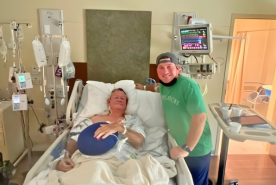May 26, 2022
Written by: Jennifer Cramer-Miller
Mary Roethler and her sister Ruth Riha have shared many experiences together. They both love shopping days (plus lunch). Birthday celebrations. Holidays gatherings. “Just normal” things, Mary said.
Another thing Ruth has shared with Mary is less common. Her kidney.
And most remarkably, that was 42 years ago. That longevity makes Mary’s kidney transplant one of the longest lasting on record at the Mayo Clinic.
Before her birth, Mary’s kidneys fused together (known as a “horseshoe kidney”). At 14, Mary started dialysis treatments to stay alive, and her doctors placed her on the transplant waiting list.
“I had never heard of a kidney transplant before,” Mary said. “When they talked to me about a waiting list, and said the word ‘cadaver’, I was scared.” She remembers thinking, “Can they do that?”
“It was a different world back then,” Mary said, and explained she’s grateful for an increase in awareness. “People didn’t know about transplants (in 1980) like they do today. And our news was local. We didn’t have 24 hours a day news channels.”
Hailing from a family with nine children (six girls and three boys) some of Mary’s other sisters considered donating their kidneys. Various circumstances ruled them out. But Ruth was an excellent match and stepped up to help when she was just eighteen.
“That’s quite an undertaking at that age,” Mary reflected.
Bravery, it seems, is another thing these sisters share. And while they were both scared; they both rose to the occasion.
Mary understands that 42 years is a remarkable milestone in the history of kidney transplants.
According to Dr. Naim Issa, a transplant nephrologist at Mayo Clinic, the average longevity for a living donor kidney transplant is 14-20 years.
At 42 years post-transplant, Mary has safeguarded Ruth’s gift for 23 years longer than Ruth had it herself. And it continues to work beautifully.
Mary, Ruth, and their seven siblings grew up on a family farm in Iowa. They spent summers jumping into swimming holes, picking rocks, helping with the livestock, and tending to the vegetable gardens. In a busy household with 11 people—they also pitched in with cooking, cleaning, and other household duties.
Mary still lives in Iowa, but after 42 years of medical maintenance at Rochester’s esteemed Mayo Clinic, she’s no stranger to Minnesota. Besides her sister, Mary is grateful for the expertise of the Mayo Clinic transplant specialists who have overseen her care over four decades.
Four-plus decades adds up to a lot of thank-you notes. At first, Mary sent yearly cards to Ruth on their donation anniversary. After about 15 years of cards, she started picking up the phone. Those appreciative phone calls transitioned into texts. Now, she says with a chuckle, Ruth probably doesn’t even remember the date.
Today, their donation anniversary isn’t top of mind because Ruth and Mary just live their lives. And this encapsulates the miracle of their celebration. It is this absence of constant awareness, this feeling of being “normal” for which Mary feels most thankful.
“Normalcy is such a gift!”
But Mary is quick to address the underlying magnitude of how “normal” she feels. “If Ruth hadn’t (donated), I may not have survived. If not for Ruth, I’d never have been married.”
And next year, Mary and her husband Randy will celebrate another major milestone—their 30th wedding anniversary.
To top it all off, Mary counts her three stepsons, six grandchildren, and seven great grandchildren among her many blessings. More family with whom to celebrate her extraordinarily normal life, thanks to Ruth.
So, of all the things these sisters share, a love of shopping, celebrations, bravery, and Ruth’s kidney—Mary and Ruth are glad they rarely ponder the last two. That’s the greatest gift of all. Together, they’ve traveled an extraordinary road to normal. They plan to enjoy their uncommonly common bond for many transplant anniversaries to come.


















